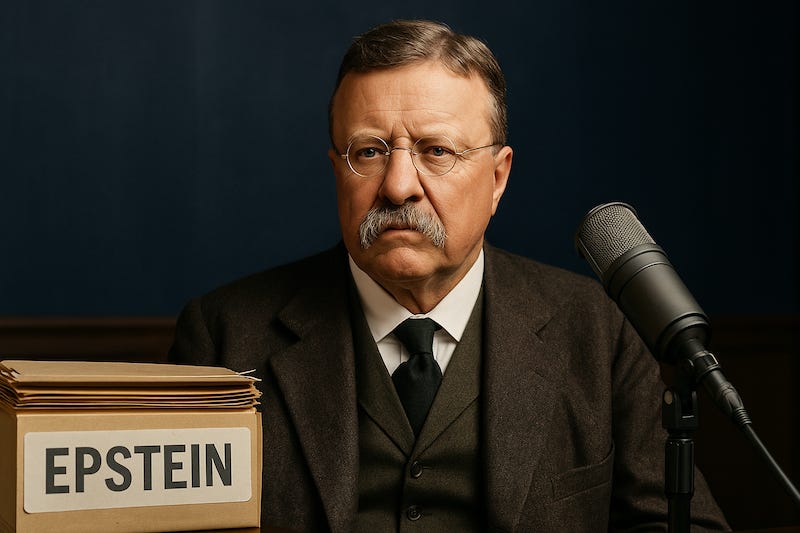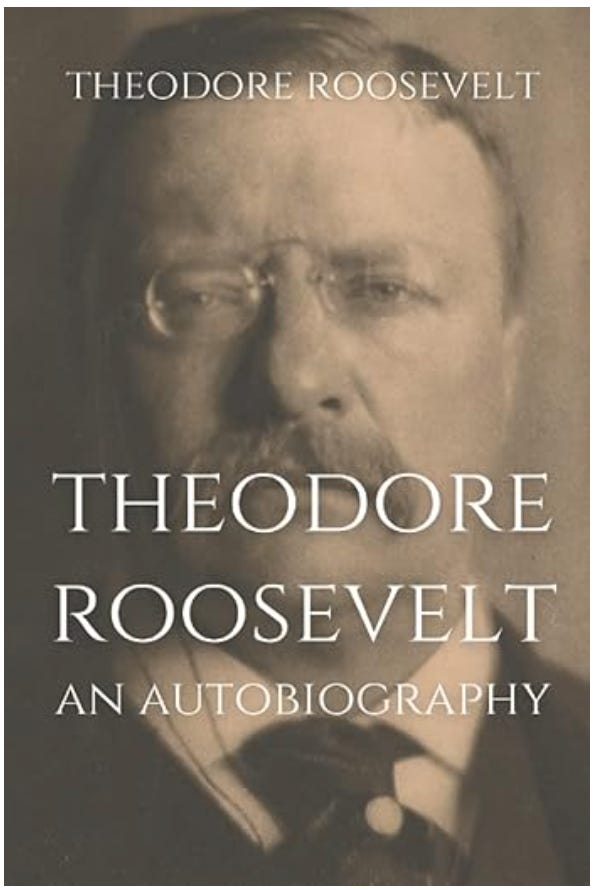Theodore Roosevelt on Justice and the Epstein Files
Transcript reconstructed via ChronoTranscriptor™ – Montauk Link established for secure transfer.
[Host Introduction]
On today's ChronoTalks, we reconnect with a president whose very name conjures images of courage, reform, and fearlessness in the face of corruption—Theodore Roosevelt.
Known for busting trusts, taking on political machines, and redefining the presidency as a force for moral action, Roosevelt joins us in a time of modern uncertainty. The Epstein scandal—its web of influence, hidden names, and legal obstructions—raises grave concerns about transparency and justice in the highest places.
We ask: What would Teddy do?
He doesn’t disappoint.
[Interview Begins]
Host: President Roosevelt, thank you for joining us. You’ve had a brief to review recent revelations around Jeffrey Epstein—the human trafficking ring, the elite connections, and, most notably, the sealed files. Your reaction?
Roosevelt: Good heavens! If even a fraction of this is true, it is not merely a scandal—it is a national shame.
Let me be clear: when wealth and influence serve as a shield against justice, we no longer have a republic—we have an aristocracy of predators.
Host: The files remain largely sealed. Some names are known, many remain hidden. How do you feel about that?
Roosevelt: I feel fury. Righteous fury.
I was not elected to protect the reputations of the rich. No man—be he a banker, prince, or president—should enjoy immunity from the law because he drinks his brandy from crystal and travels by private yacht.
If these sealed documents contain evidence of crimes, they must be released. Not tomorrow. Not after deliberation. Now.
Host: Some argue that releasing the names would endanger public trust in institutions.
Roosevelt: Balderdash.
Public trust is not preserved through silence. It is preserved through truth. If that truth shakes a few ivory towers, let them tumble.
I have long said: the best way to clean up a swamp is not to sprinkle perfume on it—but to drain it in full view of the people.
Host: In your day, you went after Standard Oil, corrupt senators, railroad barons. How would you approach something like this?
Roosevelt: With relentless moral clarity and a team of incorruptible prosecutors.
I would summon every ounce of federal power, every legal mechanism, every press ally, and every damn ounce of daylight I could find—and I would shine it on these files until the rot could no longer hide.
And if anyone stood in the way? I would remind them that the law was not written to protect them—but to protect the people from them.
Host: Some critics claim this is all political. That pushing for disclosure is partisan.
Roosevelt: When children are trafficked and abusers hide behind power, there is no “left” or “right.” There is only right and wrong.
If a republic cannot summon the courage to investigate itself, it does not deserve to call itself free.
Let the chips fall where they may. Let every name be read into the record. And if it causes discomfort in the drawing rooms of the powerful—so much the better.
Host: What would you say to those currently in office who remain silent on this?
Roosevelt: Silence in the face of evil is complicity.
To every senator, judge, and cabinet secretary who averts their gaze: you were not elected to hide. You were elected to serve justice. If you lack the spine to do it, then resign, and let someone more worthy take your place.
Host: Last question, Mr. President. Why does this matter so much—so urgently—to you?
Roosevelt: Because justice is not an accessory to power—it is the soul of a democracy.
These files represent not just the crimes of men, but the test of a nation’s character. If we fail to act—if we shrug and move on—then we have declared that the powerful may prey upon the weak without consequence.
I will not be part of such a republic.
Expose them. Try them. And if guilty, let them face the full and terrible weight of the people’s justice.
[Closing]
Teddy Roosevelt didn’t mince words in life, and certainly not in this ChronoTalks session.
In an era of cynicism and paralysis, his voice is a reminder that leadership is not measured by calm avoidance—but by the courage to confront the storm.
Next time: We return to the Renaissance with Leonardo da Vinci, asking him how he’d design AI—and whether it should be stopped.
Until then, stay curious—and stay vigilant.
First published in 1913, Theodore Roosevelt: An Autobiography remains one of the most engaging and insightful presidential memoirs ever written. This new edition presents a carefully restored and annotated version of the 26th President’s own account of his life—a vivid narrative that spans his formative years, dynamic political ascent, and his legendary leadership on the battlefield and in the White House.
Roosevelt’s storytelling brims with energy and candor as he recounts his privileged yet physically challenged childhood, his transformative experiences at Harvard, and his early ventures into public service in New York politics. He offers gripping recollections of his time as a Rough Rider during the Spanish-American War, along with personal reflections on his vice presidency and the unexpected path to the nation’s highest office following the assassination of President McKinley.
More than just a record of events, this memoir reveals the bold ideals and reformist spirit that defined Roosevelt’s approach to politics and leadership—his belief in civic virtue, national strength, and progressive change. With his trademark wit, moral clarity, and literary polish, Roosevelt paints a compelling self-portrait that is both historically significant and deeply human.
Considered a landmark in presidential literature, Theodore Roosevelt: An Autobiography offers timeless lessons in courage, ambition, and public service from one of America’s most visionary leaders. More information…



